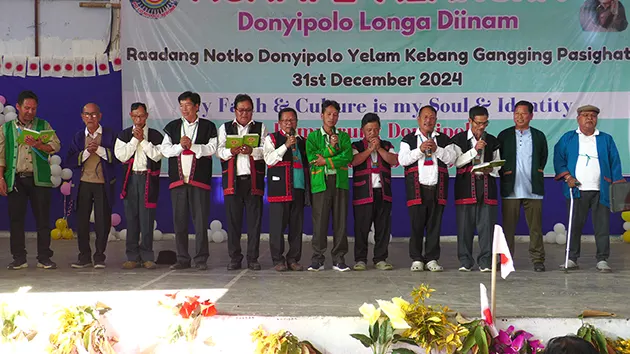[ Mingkeng Osik ]
PASIGHAT, 31 Dec: On Donyi Polo Day – 31 December – a significant religious and cultural celebration took place in Engo Takar in Forest Colony here in East Siang district. Organised by the Central Donyi Polo Yelam Kebang, the event brought together members of the Adi community to honour their ancient faith and tradition.
This day, revered across the region, is dedicated to the worship of Donyi (sun), and Polo (moon), the two central symbols in their animistic belief system. The celebration is not only a time for spiritual reflection but also serves as an annual reminder of the faith’s formal recognition.
The event commenced with offering of prayers, and arrival of delegates from all walks of life.
Dr Tajom Tasing, the president of the Central Donyi Polo Yelam Kebang, spoke in an exclusive interview about the historical and cultural significance of Donyi Polo Day. According to Dr Tasing, the roots of the celebration run deep in the community’s traditions, but the formalisation of Donyi Polo as a religion was a milestone in 1986. This pivotal moment was largely driven by the efforts of the late Talom Rukbo, a visionary leader who unified the community and structured Donyi Poloism as an organised faith.
Dr Tasing elaborated how Talom Rukbo’s efforts in 1986 were critical in bringing the Adi people together under a common religious identity, which not only reaffirmed their spiritual practices but also elevated their cultural pride. “The formalisation of Donyi Poloism gave us a stronger sense of community and purpose,” Dr Tasing explained. “It is a day that unites us in worship, reflection, and respect for the natural forces that sustain our lives,” he added.
The celebration in Engo Takar was marked by traditional rituals, prayers and communal activities that emphasised the connection between the people and nature. Rituals centred around the sun and the moon – symbols of life and guidance – were performed by community elders while the younger generation actively participated in cultural dances and songs.
These events highlighted the community’s enduring commitment to their faith and tradition. For the Adi community, Donyi Polo Day is more than just a religious observance; it is a celebration of their identity, culture and connection to the environment. The establishment of Donyi Poloism as a religion in 1986 created a lasting legacy that continues to guide the community today.
In conclusion, Donyi Polo Day is not only a religious celebration but a reaffirmation of the Adi community’s unbreakable bond with their traditions and the natural world. The legacy of Talom Rukbo and the continued efforts of leaders like Dr Tasing ensure that this faith will continue to thrive, helping preserve the identity and values of the Adi people for years to come.




